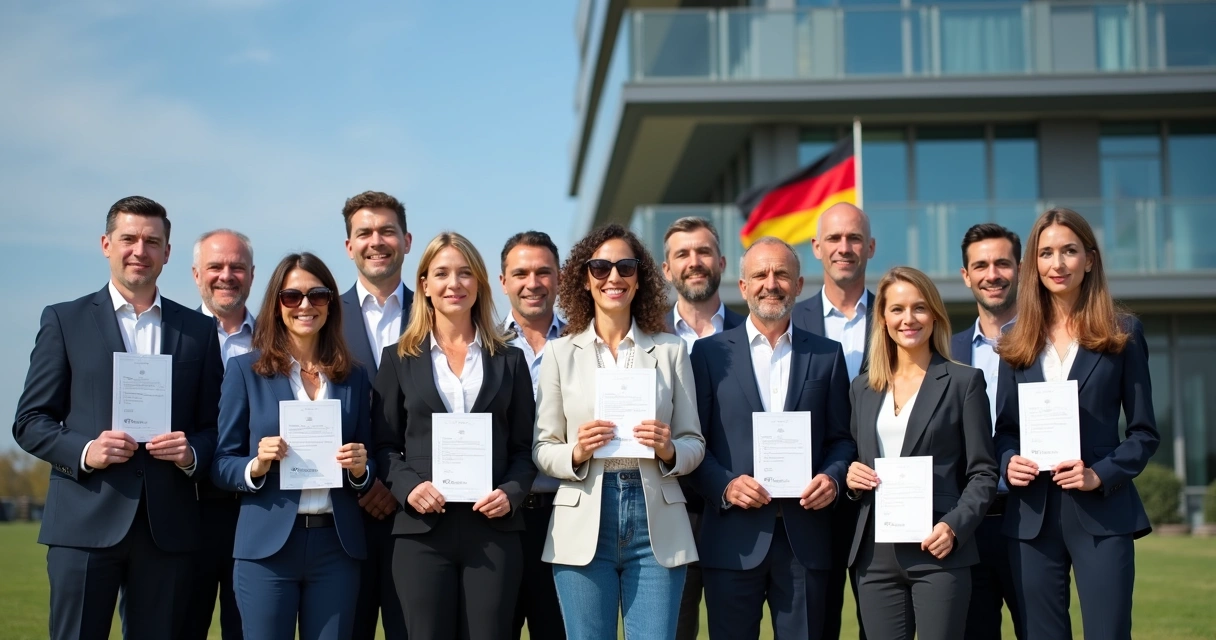The lines between research and innovation, between labs and startups, blur more with each year. Yet, when your German company is looking to bring global talent on board, the distinction between a research visa and a skilled worker visa becomes sharply defined. The rules, processes, and outcomes they offer shape the possibilities for your business. If you want to attract global expertise—scientific minds or in-demand tech professionals—it is worth understanding how each path works and which one fits your ambitions.
In 2024, Germany issued nearly 60,000 skilled worker visas, a significant increase as the country answers its workforce challenges, especially in IT. At the same time, around 10,000 research visas were granted, fueling academic and industry partnerships in laboratories and R&D units. Two paths. Two futures. This article is for those leading German technology and innovation-driven companies and startups, aiming to grow legally, effectively, globally—and as smoothly as possible, ideally with support from expert partners like EWS.
Your future may depend on the visa you choose.
The skilled worker visa and the German research visa are very different animals. Yes, both allow talented non-EU nationals to work or conduct research in Germany. But their purposes, requirements, restrictions, and the audiences they attract set them apart. Misunderstand how each works, and you risk unnecessary delays, costs, or even lost talent. Let’s get that distinction clear.
Think of the research visa as Germany’s invitation to the international science and innovation community. This pathway is for researchers, scientists, and academics coming to Germany to carry out independent research projects or to work within research institutions. Typical holders are post-docs, doctoral candidates, experienced scientists, or R&D staff joining German universities or research organizations.
 Who qualifies? Researchers with a hosting agreement or contract from a recognized German institution
Who qualifies? Researchers with a hosting agreement or contract from a recognized German institutionBy contrast, the skilled worker visa is designed for experienced professionals in fields where talent is in high demand. IT, engineering, health, mathematics, and science are the main areas. A valid job offer from a German company is required, as well as recognition of the applicant’s qualifications. This permit covers employment, not academic research per se.
Both routes offer incredible opportunities. But the path is different. And for innovation-led companies, choosing wisely matters.
The actual requirements for bringing in researchers versus skilled workers are distinct, sometimes surprisingly so. Where a research visa focuses on the project and institutional ties, the skilled worker visa is anchored in proof of experience and job relevance.
Eligibility isn’t a matter of opinion—it’s about paperwork.
Once all documents are submitted, the clock starts ticking. In 2024, official data shows:
The research route is, statistically, slightly quicker. This might reflect the partnership between institutions and government, or simply a smaller application pool. Approval rates tend to be high for both, especially when paperwork is complete and requirements are clear.
But numbers only tell part of the story. For German HR professionals—or their partners at EWS—getting the “right” approval, as quickly as possible, may hinge on pre-submission checks and knowledge of local processes. That’s where solutions like Employer of Record come into play for new or expanding teams.
Both the research and skilled worker visas open doors in Germany, but those doors don’t all lead to the same rooms. Here’s what visa holders can expect in practice.
Researchers are, essentially, linked to one project and institution. Skilled workers gain broader employment rights, especially in high-demand sectors. As your company assesses staffing strategies, these factors can weigh heavily.
According to the Federal Office for Migration and Refugees, Germany saw nearly 60,000 skilled worker visas approved in 2024, a 15% year-over-year increase. Of these, 25% were for IT jobs, echoing the HR challenges many German tech companies face (Federal Ministry of Labour and Social Affairs).
On the research side, the German Academic Exchange Service reports roughly 10,000 research visas issued, a 10% rise from 2023. These numbers tell their own story: the skilled workforce migration track is larger, but Germany’s research sector remains strong and attractive, especially for global collaboration.
Meanwhile, data from the Federal Ministry of Education and Research finds that about 70% of research visa holders are affiliated with universities, and 30% join private-sector or non-university research teams. This blend of academic and industry-driven R&D is, arguably, a valuable asset for Germany’s innovation landscape.
 Sector focus: who uses each visa?
Sector focus: who uses each visa?The sectors most reliant on the skilled worker visa show Germany’s priorities in 2024. IT, engineering, and health dominate the applicant pool. Out of all skilled worker visas, a quarter are used to bring IT talent to the country—no small number, and a strong response to the “war for talent” in Europe’s strongest economy (Federal Ministry of Labour and Social Affairs).
The research visa, by contrast, is more sector-flexible. It welcomes academics and scientists in everything from hard sciences to social research to advanced technology. Many of these visitors, especially those on junior or post-doc contracts, join universities, but a significant share go to private and independent institutes (as confirmed by Federal Ministry of Education data).
While both visas require some paperwork, reference checks, translation, and local expertise, the actual steps differ. Most applicants must apply at a German embassy or consulate abroad, or via approved channels for in-country switching.
Company HRs and managers often find it worthwhile to partner with a local specialist or an Employer of Record—saving time, reducing risk, and minimizing drag on day-to-day business. EWS supports companies with not just visa guidance but also payroll, compliance, and onboarding, smoothing over the messier, less predictable steps inherent to any cross-border move. Learn more about how choosing between EOR and entity setup affects new hires and compliance.
The distinction between “researcher” and “skilled worker” is not always as rigid as the paperwork suggests. Many research visa holders eventually join private industry, spin off companies, or support corporate innovation after their initial project concludes. Conversely, some skilled employees find themselves contributing to company-internal R&D or industry-funded research that blurs traditional lines.
For tech companies and series B/C startups, the choice sometimes means:
Where EWS often enters the picture is at the intersection: When an R&D initiative needs to quickly onboard global talent, or when an innovation team wants flexibility to move researchers into new roles as their projects mature. Sometimes, the difference between EOR and PEO comes into play for first hires or complex project teams.
Visa choice shapes team flexibility.
Once a researcher or skilled talent arrives in Germany, a few realities become clear:
These backstage tasks are often overlooked until they become stumbling blocks—simple admin in theory, but real sentinels at the border in practice. This is where German managers, especially those scaling quickly, appreciate skill-based hiring support and compliance partners who know how to get talent across the finish line, legally and ethically.
Both visa types can, eventually, lead to permanent residence, though the route is longer or shorter depending on employment status, type of contract, and integration steps. For example:
Paths to permanent stay are not automatic, but structured—good planning speeds things up. And for companies using an Employer of Record service, the admin steps are clarified and handled with care.
 Challenges and pitfalls when hiring foreign talent
Challenges and pitfalls when hiring foreign talentThere’s no denying that bringing global expertise to Germany can get complicated. Issues may include:
Being prepared, or working with a partner like EWS, can soften the risk of administrative hiccups and lost time. Building robust relationships with German employment and foreigner authorities is, I think, just as key as attracting smart people. If you want to understand more about how to structure new hires in a compliant and inclusive way, refer to this overview on inclusive recruitment.
For companies, the choice between research and skilled worker recruitment is never just about paperwork—it’s dollars (or euros) and time. Consider these perspectives:
The right support makes complexity manageable.
In 2024, Germany is not just bringing in talent; it is actively adjusting its rules to keep up with the pace of innovation. The trend towards skill-based migration and international research partnerships reflects the future of the labor market (Federal Office for Migration and Refugees).
For German innovation leaders—those at the front lines of HR, global mobility, or technical hiring—the question is not just which visa, but what structure supports the growth your company envisions. Sometimes change is fast. Other times, what matters most is having clear, adaptable solutions at every step.
 Conclusion: making the right choice with EWS
Conclusion: making the right choice with EWSThe distinction between the Germany research visa and the skilled worker visa shapes not only your hiring strategy, but the very DNA of your company. Research visas are designed for those pushing boundaries in academia and R&D; skilled worker visas unlock experienced talent for the engine room of the business. Both are vital, but they serve different needs, carry different rules, and come with different renewal tracks and family provisions.
For innovation-led German companies—and ambitious startups reaching Series B or C—knowing which talent fits which route saves time, money, and future headaches. If you want to ensure your company remains compliant, competitive, and attractive to global talent, EWS is positioned to be your reliable partner. With tailored solutions for Employer of Record, global mobility, payroll, and company formation, we take pride in connecting the dots for your growth and expansion.
The right visa decision today opens doors tomorrow.
Feeling ready to streamline your cross-border hiring and global workforce management? Reach out to EWS today—find out how our in-depth knowledge and hands-on support can move your company confidently forward in Germany and beyond.
The main difference lies in purpose and eligibility. A research visa is meant for scientists, academics, or R&D experts coming to Germany to conduct a specific research project at an approved institution. It usually ties you to one project and employer. The skilled worker visa is aimed at professionals in high-demand fields—especially tech, health, and engineering—coming to fill a qualified job with a German company. This visa enables broader employment rights and some job flexibility. Both have different requirements and lead to different long-term options.
To apply, you need a hosting agreement with a recognized German research institution and proof of funding, qualifications, and health insurance. Schedule an appointment with the German consulate or embassy, provide biometrics, submit documents, and pay the fee. Most applications are processed within about 6 weeks. After arrival, you register locally and receive a residence permit. Double-check all paperwork, and consider working with a compliance partner (like EWS) to avoid common mistakes.
Not exactly. Both visas are processed efficiently in Germany, but the skilled worker visa may involve additional steps around qualification recognition and minimum salary thresholds. Processing time is about 8 weeks on average—slightly longer than for research visas. The “easier” path depends on the applicant’s background and the completeness of their paperwork.
Yes, you can work—but only in the research position and institution for which your permit is granted. Side jobs or unrelated employment are usually not permitted. If you want broader work authorization, the skilled worker visa might be a better fit, as it allows more flexibility in job roles and employers within your qualified field.
Both can lead to long-term residence, but through slightly different routes. Skilled worker visas tend to offer a clearer pathway to permanent stay, especially if employment is continuous and meets social insurance requirements. Research visas can also transition to permanent residence, especially when holders integrate into the workforce. Your individual career goals, type of employment, and future plans will determine which is better for you or your company. For companies, consulting with partners like EWS brings clarity to these long-term decisions.
Hiring in Morocco: North Africa’s Emerging Tech Talent Market
Hiring in Portugal: What You Need to Know in 2026
Global Mobility and EOR: How to Align HR and Immigration in 2026
Beyond China: Where Asian Companies Are Hiring in 2026
How Recruiters Use EOR to Win Big in Fintech Placements
Europe’s Freelancer Laws in 2026: When to Switch to EOR
Hiring in the Philippines: 2026 Guide for Global Employers
How Recruiters Use EOR to Unlock German Healthcare Placements
Hiring in Colombia: 2026 Compliance Guide for LatAm Expansion
Hiring in Türkiye (Turkey): 2026 Guide for International Teams
How Recruiters Use EOR to Handle Rapid Global Onboarding
Top 5 EOR Red Flags to Avoid in 2026
EOR vs Entity Setup in 2026: What Startups Need to Know
10 Things You Didn’t Know Your EOR Could Do
When to Use a Payroll Provider vs Full EOR in Global Hiring
January Compliance Watch: What’s Changing in APAC Labor Laws
Hiring in Turkey in 2026: Costs, Contracts, and EOR Options
Contractor or Employee? Compliance Risks to Watch in 2026
What’s Changing in European Payroll Compliance in 2026?
How to Use EOR to Win More Government or Public Sector RFPs
Hiring in Colombia: Fast-Growing Talent Pool, Low Total Cost
Remote Tech Jobs Surge 33% in Ireland: Skills You Need Now
Remote Work in APAC: 7 Data-Driven Trends for 2026 Expansion
Remote Payroll Headaches: 7 Mistakes HR Teams Make
Freelancer vs EOR in 2026: Cost, Risk, and Speed Compared
How Employee Experience Drives Retention and Business Growth
How HR Can Reduce Burnout Amid AI, Budget Cuts, and Change
Employment Contracts: What HR and Global Managers Must Know
PEO Explained: How It Simplifies Global Workforce Management
Global Mobility: A Complete Guide for HR and Global Managers
Remote Workforce: A Complete Guide to Managing Global Teams
Workforce Planning: A Step-by-Step Guide to Strategic Hiring
How Recruiters Use EOR to Increase Revenue Per Client
The Secret to Winning Global RFPs? A Strong EOR Partner
Top 7 Hiring Trends Shaping Global Teams in 2026
Hiring in Türkiye: Key Labor Laws and Employer Risks in 2026
GCC Hiring Compliance Update: What’s Changing in 2026
How to Hire in Turkey in 2026: A Strategic EOR Guide
Why modern recruitment agencies outsource compliance to EOR partners
How adding an EOR partner helps agencies win more RFPs
EOR Opportunities in Poland: Why It’s Europe’s Talent Powerhouse
Cross-Border Hiring Trends for 2026: Insights for Global Recruiters
How to Build a Scalable Payroll Strategy Across MENA
Contractor vs Employee in Germany: What’s the Risk in 2026?
“Place globally, bill locally” — the new recruiter cheat code
Top 5 Compliance Mistakes When Expanding to the UAE
Why EOR is Key to Winning Public Sector Tenders in Europe
Growth formula for agencies using EOR to expand key accounts
How EOR helps recruiters stay ahead of fast-changing GCC compliance
Employer of Record in Mandarin: What is 境外雇主服务?
How to Use an EOR for Temporary Projects (中国公司如何为短期海外项目使用EOR服务)
Why “Go Global” Must Include Compliance (“走出去”战略中的合规盲点)
中资企业如何选择欧洲EOR供应商?(How to Choose the Right EOR Partner in Europe)
与当地政府打交道:中国公司需要了解的合规礼仪 (Cultural Compliance for Chinese Firms)
中国公司海外人力结构案例分析:制造业、科技与能源 (HR Case Studies: Chinese Firms Abroad)
How Guanxi Influences Hiring in the Middle East (关系在中东招聘中的作用)
Top 5 Risks When Hiring in the Gulf (中国企业在海湾地区招聘的五大风险)
Managing Compliance in Multi-country Projects (中国企业多国项目的人力合规管理)
The $100K Visa Shock: Why Global Hiring Just Replaced the H-1B
How to Set Up Payroll For Hpc And Ai Teams
Contracting Machine Learning Talent Abroad
Everything on Hiring Foreign Phds In German Tech Labs
Cross-Border Ip Protection In R&D Teams
How To Classify Freelancers In Tech Innovation
How Eor Helps Tech Firms Legally Hire In Germany
Dual Contract Structure For International Researchers
Data Protection Obligations For Remote Tech Staff
Germany Research Visa Vs Skilled Worker Visa
Everything on Nis2 Directive Compliance For Eu Tech Workers
Global Mobility For Deep Tech Startups In Germany
Payroll For EU Embedded Systems Developers
Relocation Support For Semiconductor Experts on EU
The Absolute Way to Hire Ai Engineers In Germany
How to Manage Benefits For German Tech Hires
Germany’S Blue Card Process For Engineers
Everything on Germany R&D Employment Compliance
Remote Hiring Of Cybersecurity Analysts In Eu
Visa Pathways For Quantum Computing Researchers
Onboarding Robotics Specialists Across EU Borders
Workforce Planning In Ai-Driven Logistics And Infrastructure
Visa Processing For High-Tech Infrastructure Staff
Managing Global Mobility In Sustainable City Projects
Cross-Border Team Management In Saudi Data Centers
Hiring Skilled Labor For Green Hydrogen Facilities
Digital Twin Technology Hiring Trends In Saudi Construction
Employer Obligations In Public-Private Energy Initiatives
Navigating Local Labor Laws For Solar Energy Teams
Talent Acquisition In The Saudi Mining Sector
Eor Solutions For Ai Engineers In Mega Projects
Regulatory Challenges In Hiring For Giga Construction Projects
Contractor Compliance In Smart City Developments
Classification Of Engineering Consultants In Vision 2030 Projects
How To Manage Workforce For Neom-Based Tech Projects
Eor For Multinational Mining Firms Operating In Saudi Arabia
Employer Of Record For Wind Energy Projects In The Gulf
Relocation Logistics For International Clean Energy Experts
Hiring Strategies For Large-Scale Construction Projects In Ksa
How To Onboard Digital Infrastructure Experts In Saudi Arabia
Payroll Setup For Renewable Energy Workers In Ksa
Strategic Relocation To Riyadh Or Doha: A Guide for Global Employers
Work Visa Processing In Qatar And Saudi Arabia
Qatar Nationalization Policy And Foreign Firms
Cost Of Setting Up A Business In Qatar: A Guide for Global Employers
Saudi Labor Court And Dispute Handling for Global Employers
Cross-Border Payroll For Ksa And Qatar Teams
End Of Service Benefits Saudi Arabia: A Guide for Global Employers
How To Manage Expat Benefits In Qatar for Global Employers
Expanding Into New Markets: Vendor Risks You Should Flag
A Guide to Cross-Border Equity Vesting for Tech Startups
Employer Branding for Multinational Teams: What Works Now
What Global C-Level Leaders Miss About Digital Nomad Visas
Succession Planning for Distributed Teams: A Practical Guide
Relocation Budgeting For Global Tech Firms
Latam Hiring Strategy: What Global Companies Should Know
Risk Of Permanent Establishment Explained
Managing Intellectual Property In Remote Work
Benefits Benchmarking Globally for Global Companies
How to Benchmark Compensation Across 100+ Countries in 2025
Checklist: Preparing HRIS for Fast International Scalability
Biometric Data in Global Payroll: Legal Boundaries Explained
8 Regulatory Updates Impacting Global HR in 2025
What are Hidden Costs of In-House Payroll?
Why Companies are Thinking Differently About Relocation
Is Your Global Mobility Program Outgrowing Spreadsheets?
Remote Work Visas: A Growing Trend in Global Mobility
Hiring in Europe Post-Brexit: What You Need to Know
Tips for Managing Multi-Time Zone Teams Successfully
Relocation Packages: What Top Talent Expects in 2025
Banking and Payroll Challenges in Saudi Arabia Markets
The Legal Risks of Misclassifying Global Workers
Why Scalability Should Drive Your Global HR Strategy
How EWS Streamlines Global Mobility for Tech Talent
Lithuania – Employer of Record
Kosovo – Employer of Record
Finland – Employer of Record
Namibia – Employer of Record
Nepal – Employer of Record
Spain – Employer of Record
Latvia – Employer of Record
Ireland – Employer of Record
Cyprus – Employer of Record
Czech Republic – Employer of Record
Italy – Employer of Record
Indonesia – Employer of Record
South Africa – Employer of Record
Tunisia – Employer of Record
Bosnia – Employer of Record
Moldova – Employer of Record
Five Tips For Improving Employee Engagement
Netherlands – Employer of Record
Germany – Employer of Record
France – Employer of Record
Portugal – Employer of Record
Bulgaria – Employer of Record
Austria – Employer of Record
Hungary – Employer of Record
Slovenia – Employer of Record
INCLUSIVITY IN THE TEAM MAKES EVERYONE WIN
Thailand – Employer of Record
Sri Lanka – Employer of Record
The Significance of an Employer of Record
Greece – Employer of Record
Mexico – Employer of Record
4 Reasons to Outsource Your Payroll
Five Recruitment Trends 2023
Malaysia – Employer of Record
Skill-Based Hiring and Benefits
Malta – Employer of Record
How To Practice Inclusive Recruitment
Israel – Employer of Record
Macedonia – Employer of Record
Jordan – Employer of Record
Macau – Employer of Record
Peru – Employer of Record
The Importance of Employer Branding
Bahrain – Employer of Record
South Korea – Employer of Record
Recruiting during a recession
Philippines – Employer of Record
USA – Employer of Record
Japan – Employer of Record
How To Setup A Business in 2023
Norway – Employer of Record
Managing Overseas Projects In 2023
Reason Of Expanding Your Workforce Globally
Croatia – Employer of Record
Colombia – Employer of Record
5 Ways To Speed Up Your Hiring Process
Egypt – Employer of Record
3 Ways To Streamline An Interview Process
Russia – Employer of Record
Saudi Arabia – Employer of Record
Hong Kong – Employer of Record
An Effective Hybrid Work Model
Turkey – Employer of Record
UAE – Employer of Record
Pakistan – Employer of Record
7 Things to Consider Before Accepting a Job
Kazakhstan – Employer of Record
3 Reasons to Encourage Employees to Generate Employer Brand Content
Denmark – Employer of Record
Sweden – Employer of Record
Bangladesh – Employer of Record
Kuwait – Employer of Record
How To Hire In The Age Of Hybrid Working
Australia – Employer of Record
Oman – Employer of Record
Qatar – Employer of Record
Ukraine – Employer of Record
Diversity – A Vital Hiring Strategy
Owning Every Moment of Your Hiring Experience
Serbia – Employer of Record
Maldives – Employer of Record
India – Employer of Record
Argentina – Employer of Record
Uzbekistan – Employer of Record
Belarus – Employer of Record
Brazil – Employer of Record
Chile – Employer of Record
Armenia – Employer of Record
3 Steps To Company Formation In The UK & Abroad
Romania – Employer of Record
Canada – Employer of Record
Morocco – Employer of Record